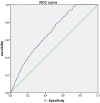C-Reactive Protein (CRP): A poor prognostic biomarker in COVID-19
- PMID: 36451818
- PMCID: PMC9702806
- DOI: 10.3389/fimmu.2022.1040024
C-Reactive Protein (CRP): A poor prognostic biomarker in COVID-19
Abstract
Introduction: The COVID-19 pandemic continues to be rampant with considerable morbidity and mortality worldwide since its emergence in December 2019. Several studies have focused on identifying different predictive factors of poor prognosis, including biological markers, such as C Reactive Protein among others. The objective of our work was to determine whether the CRP levels on admission to the intensive care unit are predictive of an unfavorable evolution of patients with COVID-19 through the experience of the Anesthesia and Intensive Care Unit of the University Hospital of Oujda and to compare our results with those reported in the literature.
Methods: We conducted a retrospective, monocentric, descriptive and analytical study in the Department of Anesthesia and Intensive Care of the Mohammed VI University Hospital of Oujda, Morocco, between March 2020 and October 2021, including all critically ill patients admitted to the department during this period and meeting the inclusion criteria. The baseline admission CRP value was arbitrarily set at 100mg/d, thus conditioning the division of our patients into two groups (group 1: CRP < 100mg/L, group 2: CRP ≥ 100mg/L).
Results: Among our 1035 included patients, 291 patients with had a CRP<100mlg/L (group 1) and 744 presented a CRP level equal or superior to 100mg/L (group 2). Lung parenchymal involvement was more severe or even critical (CT involvement > 75%) in group 2 (60.8%) compared to group 1 (39.2%). In group 2, 79.8% of patients were mechanically ventilated, compared to 20.2% of patients in group 1. Finally, the mortality rate in patients with a CRP ≥ 100mg/l was 77.4%, compared with 22.6% for patients with a CRP < 100mg/l. These findings are all statistically highly significant (p<0.001).
Conclusion: Given the high contagiousness of the virus and the emergence of several variants, the management of the COVID-19 pandemic has focused more on prevention through vaccination against the virus, but also on an early identification of patients likely to evolve unfavorably for a personalized management.
Keywords: C Reactive Protein (CRP); COVID-19; SARS-CoV-2; biomarkers; mortality; prognosis.
Copyright © 2022 Bouayed, Laaribi, Chatar, Benaini, Bouazzaoui, Oujidi, Berrichi, El Aidouni, Bkiyar, Abda and Housni.
Conflict of interest statement
The authors declare that the research was conducted in the absence of any commercial or financial relationships that could be construed as a potential conflict of interest.
Figures
Similar articles
-
Benefits of Tocilizumab in patients with a severe form of SARS-CoV-2 infection: Experience of the intensive care unit of the Mohammed VI university hospital, Oujda.Ann Med Surg (Lond). 2021 Jul;67:102514. doi: 10.1016/j.amsu.2021.102514. Epub 2021 Jun 25. Ann Med Surg (Lond). 2021. PMID: 34221397 Free PMC article.
-
Therapeutic plasma exchange in the treatment of COVID-19 induced cytokine storm: the first Moroccan experience.BMC Infect Dis. 2023 Nov 25;23(1):829. doi: 10.1186/s12879-023-08816-6. BMC Infect Dis. 2023. PMID: 38007416 Free PMC article.
-
Understanding the Impact of COVID-19 on Roma Vulnerable Communities in Western Romania: Insights and Predictive Factors from a Retrospective Study.Viruses. 2024 Mar 12;16(3):435. doi: 10.3390/v16030435. Viruses. 2024. PMID: 38543800 Free PMC article.
-
Value of leukocytosis and elevated C-reactive protein in predicting severe coronavirus 2019 (COVID-19): A systematic review and meta-analysis.Clin Chim Acta. 2020 Oct;509:235-243. doi: 10.1016/j.cca.2020.06.008. Epub 2020 Jun 10. Clin Chim Acta. 2020. PMID: 32533986 Free PMC article.
-
Biomarkers and outcomes of COVID-19 hospitalisations: systematic review and meta-analysis.BMJ Evid Based Med. 2021 Jun;26(3):107-108. doi: 10.1136/bmjebm-2020-111536. Epub 2020 Sep 15. BMJ Evid Based Med. 2021. PMID: 32934000 Free PMC article.
Cited by
-
Presepsin as a prognostic biomarker in COVID-19 patients: combining clinical scoring systems and laboratory inflammatory markers for outcome prediction.Virol J. 2024 Apr 26;21(1):96. doi: 10.1186/s12985-024-02367-1. Virol J. 2024. PMID: 38671532 Free PMC article.
-
Assessment of COVID-19 risk factors of early and long-term mortality with prediction models of clinical and laboratory variables.BMC Infect Dis. 2024 Jul 9;24(1):685. doi: 10.1186/s12879-024-09592-7. BMC Infect Dis. 2024. PMID: 38982355 Free PMC article.
-
Independent Risk Factors and Mortality Implications of De Novo Central Nervous System Involvement in Patients Hospitalized with Severe COVID-19: A Retrospective Cohort Study.J Clin Med. 2024 Jul 5;13(13):3948. doi: 10.3390/jcm13133948. J Clin Med. 2024. PMID: 38999510 Free PMC article.
-
Cardiovascular autonomic dysfunction in "Long COVID": pathophysiology, heart rate variability, and inflammatory markers.Front Cardiovasc Med. 2023 Sep 1;10:1256512. doi: 10.3389/fcvm.2023.1256512. eCollection 2023. Front Cardiovasc Med. 2023. PMID: 37719983 Free PMC article. Review.
-
A Nomogram for Predicting Delayed Viral Shedding in Non-Severe SARS-CoV-2 Omicron Infection.Infect Drug Resist. 2023 Apr 27;16:2487-2500. doi: 10.2147/IDR.S407620. eCollection 2023. Infect Drug Resist. 2023. PMID: 37138833 Free PMC article.
References
-
- COVID-19 dashboard by the center for systems science and engineering (CSSE). Johns Hopkins University (JHU). Available at: https://coronavirus.jhu.edu/map.html. - PMC - PubMed
MeSH terms
Substances
LinkOut - more resources
Full Text Sources
Medical
Research Materials
Miscellaneous


